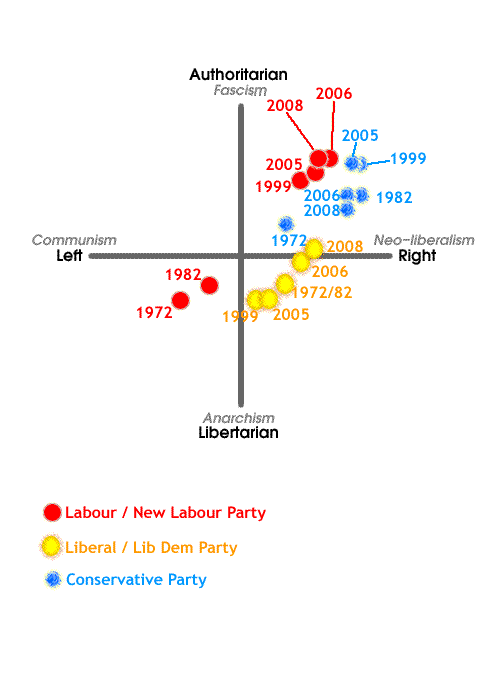Back in 1997, hip culture-tech magazine
Wired (5.07) wrote an editorial piece "The Long Boom: A History of the Future, 1980 - 2020". The strapline was "We're facing 25 years of prosperity, freedom, and a better environment for the whole world. You got a problem with that?"
The article repeated the usual Neolibertarian bullshit, a lot of which can be traced back to former Goldman Sachs exec and then Secretary of the Treasury Alan Greenspan. As bullshit goes it was very persuasive and taken up and spread around by most mainstream politicians and economists.
Just 10 years later Lehman Bros collapsed because their debtors were defaulting at such a rate that their cash flow was insufficient to pay their own debt commitments. This initiated a cascade of events that led to the worst economic recession in history (arguably) which we now call the Global Financial Collapse. A few prescient economists pointed out that the high levels of personal and business debt, and the rate at which that indebtedness was increasing, would inevitably lead to disaster. But no one listened to them then and hardly anyone listens now.
If you keep borrowing, there comes a point when paying off debts soaks up all of your disposable income. And if you have a sudden need, or there is an interest rate fluctuation, or you lose your income, then you can no longer service your debts and go bankrupt. When you income is rent paid on borrowed money, as it is for all banks, and many debtors default on payments at once, then this can cause serious problems. When you over-lend to thousands of people who cannot afford to service their debts, then disaster is inevitable.
When we borrow heavily (as on average people and businesses did and are doing) then the future becomes impoverished. As individuals we can only stave off that impoverished future by tightening our belts or borrowing more, but more borrowing only undermines the future more and eventually it must collapse. Businesses can borrow and invest in growth and trade their way out of trouble as long as there is sufficient demand. But when the consumers have maxed-out their credit cards and their disposable income is paying off the interest, then cannot spend to create demand for products. This was the fatal flaw in the thinking of the Wired editorial and of all mainstream thinking about economics in the 1990s and 2000s. This still is the fatal flaw of the idea of the Long Boom - the length of it was determined by how much we could undermine our own future and have not collapse on us. The mainstream has yet to really admit that this is what went wrong.
Governments on the other hand operate differently. Our UK government has convinced more or less everyone that the government is like an individual household, that investing is not an option and that belt tightening is the only way to balance the budget. And that balancing the budget is the only way to prosperity. Spending increases are only for the purposes of buying votes in elections (as we have seen this week). But every £ the government spends is an investment - it returns a dividend to the government in taxes (presuming the government is competent and willing to collect them). The government that builds a house provides jobs for builders (better employment figures), who spend money in shops (better retail figures) and shops buy from wholesalers and manufacturers (better manufacturing figures) and tax is extracted from each transaction. The house is sold (another wodge of tax) or rented (generating taxable income over the long term) and people living their pay for utilities. But they are also comfortably housed and create relationships with neighbours - an indefinable good. The returns for the government and by extension for society, are long term and positive. And a government can borrow the money to build the house at 0% interest over a very long term, and thus both pay off the debt and make a profit in a way that no business can do.
Our present government is systematically misrepresenting the nature of a national economy to hide ideological commitment to minimal government in the service of promoting unlimited profit making. As we have seen quite clearly in the last five years, only the wealthy benefit from this.
Looking back to the 1990s and before we were all seduced by the idea that debt was a good thing. The story of that seduction has yet, I think, to be told. My parents generation grew up knowing that debt was a bad thing. One borrowed for a house, and perhaps to invest in growing a business, but one would never borrow money for consumer goods. One saved up or went without. And this is both rational and sensible and we need to get back to this as a personal ethos. On the other hand it is madness for a government to operate this way and they need to get back to judicious investment in the economy when the private sector is unable to. The
Long Boom was a
Big Lie. The boom was created on the back of personal indebtedness and collapsed as the weight of debt broke our backs.
Our present government is still encouraging, still relying on, citizens to undermine their own future by borrowing to spend, in order to further enrich the wealthy. And yet, without any sense of irony, they mock the Labour Party as the party of borrow and spend. Of all the many reasons to mock the Labour Party (and there are many) it is ironic that the Tories should harp on this one.




